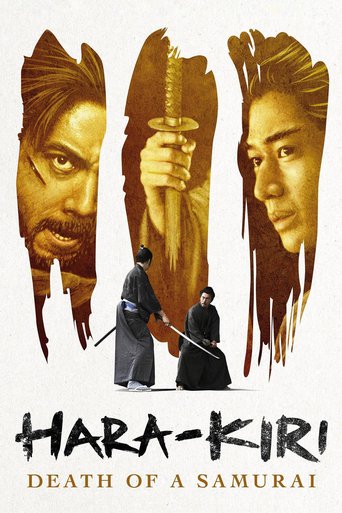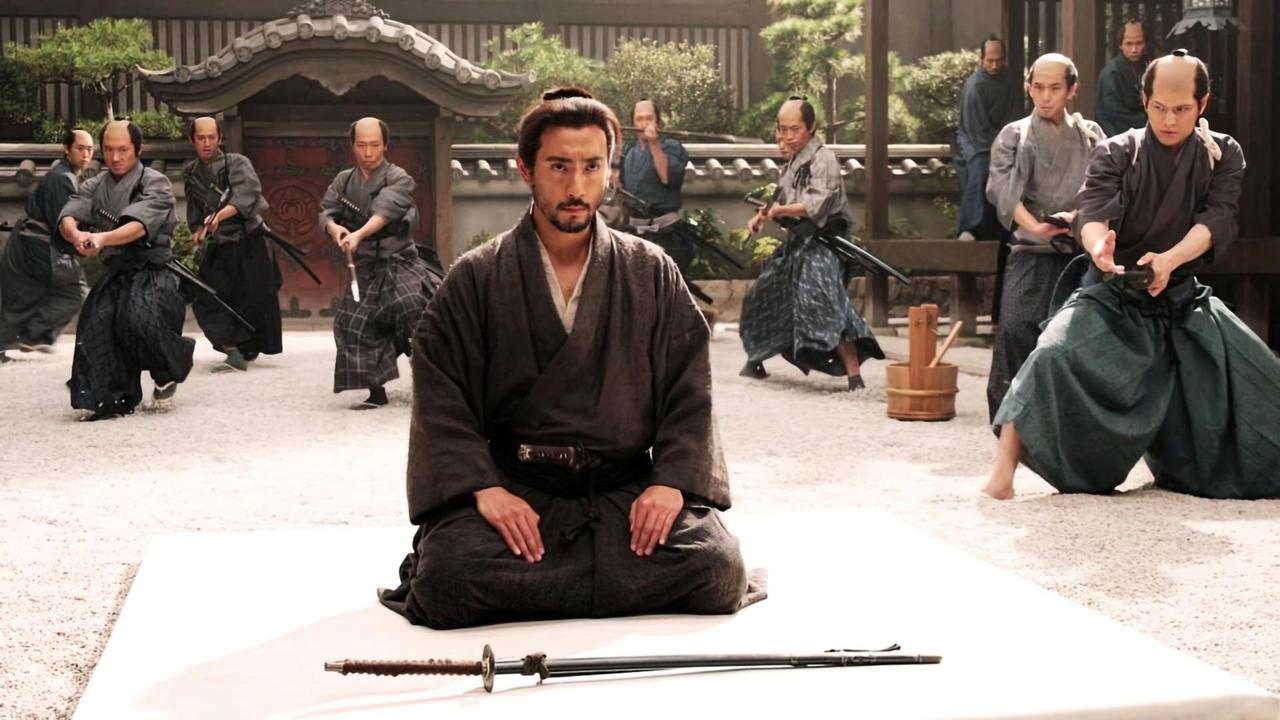Tweekums
In seventeenth Century Japan it is a time of relative peace and samurai who were in service to defeated warlords have fallen on hard times. One, Hanshiro, goes to the local castle asking if he me commit hara-kiri, ritual suicide, in the castle courtyard. Before granting permission he is told the story of Motome, another poor samurai from the same clan as Hanshiro, who made a similar request a year before. Several others had made similar requests but changed their minds when offered money; suspecting Motome is another 'suicide bluffer' they decide to make an example of him and force him to go ahead with his suicide; even after he begs for three ryo for his sick wife, Miho, and child
not only that he must use his wooden bladed sword. This is slow and agonising. We then learn that Hanshiro not only knew Motome but is his father in-law and now he wants revenge. In flashback we then see Hanshiro and Motome's past and how the latter became so desperate. We then return to Hanshiro's present for the inevitably tragic conclusion.I have yet to see the original film so can't say how this compares. Judging it on its own I can say I really enjoyed it even if it was far from the 'samurai action film' I'd expected. The scene where Motome is forced to disembowel himself with a wooden sword is painfully gruelling to watch as it goes on and on
even though it doesn't dwell on the wounds inflicted it is a hard watch; and rightly so. When we learn of his connection to Hanshiro that painful scene explains why he is so desperate to show how a real samurai lives and dies. The cast does a fine job; most notably Ebizô Ichikawa, Eita and Hikari Mitsushima as Hanshiro, Motome and Miho respectively. Takashi Miike's direction is impressively subtle given his reputation over-the-top violence. Overall I'd recommend this; just don't expect lots of action; this is about character.
mistabobdobolina
A samurai film set in the first generation after the rise of the Tokugawa Shogunate -- when the samurai were beginning to perceive the bitter reality that unity and peace were the death knell of much of their usefulness as a caste -- Hara-Kiri centers around a story of disgrace and revenge, but its take on this subject matter is unique, and it is one of the very few samurai films that actually reaches the point of questioning the ethos of "warrior's honour." It is not an action film, for the most part; although its climactic act does feature a fascinating one-against-many throwdown, it isn't there to provide gore and death. This is a film that revolves around story, characters and ideas.The basic premise: with many samurai penniless and out of work under the Shogunate -- which has become vindictive about eliminating all possible threats to its power and has shut down whole domains -- a uniquely samurai kind of con artistry has sprung up, called the "suicide bluff," in which a ronin shows up at a well-appointed lordly estate, begs the use of the courtyard to commit seppuku, and thereby hopes to win the lord's sympathy and to be offered some money or a position in his retinue instead.The film begins with one such story set at the House of Ii; the senior retainer, set to hear a suicide request from a penniless ronin, eyes him skeptically and then tells him (in flashback form) the story of another such ronin who came by attempting a suicide bluff just a short while earlier. The story of that young man, who shows up looking skinny, timorous and pathetic to make his request, is the story of an unsuspecting rube badly miscalculating the seriousness of the House of Ii's commitment to the samurai ideal, notwithstanding that most of its younger warriors have never seen combat. When the retainers of Ii discover that the young ronin has brought only a bamboo practice sword with him, they decide in rage to call his transparent bluff, summoning out the whole house to witness his suicide and sternly demanding that he go through with it... using only that same bamboo sword.The youth's panic and seeming cowardice seem contemptible at first... but there is something just as twisted about the retainers' contempt when they discover he was just trying to get money to buy medicine for a sick wife and child. Finally, seeing that there's no way out, he does contrive to commit seppuku with the bamboo sword, in a scene of surpassing drawn-out agony and horror that will stay with you for days. (His "second," assigned to behead him, seems in particular to almost relish the young man's suffering, refusing to end it until he's twisted the bamboo blade in his guts to the man's satisfaction.) Back to the present, and the senior retainer of Ii offering this latest ronin the chance to leave with no questions asked. And that's when we discover that the two ronins' stories are connected... and that there's a larger objective of retribution in the newcomer's actions.The drama that follows -- which affords us a chance to see the two ronin in an entirely different light, to discover their relationship and what brought them to their desperate pass, and to question whether the suppression of humaneness and empathy in the samurai code of conduct really just isn't a form of empty madness -- is deliberately-paced, intricately structured, and moving. It is well worth seeing, and indeed quite probably the best Japanese drama to be produced so far this century.
sriram_m
Director Takashi Miike has emerged and grown as an explosion of artistry in modern Japanese cinema, from controversial past image, from international notoriety for depicting shocking scenes of extreme violence. He became an auteur to write his mark in modern world cinema. With unmatched emotional intensity, using silence as fierce force, he got abilities of higher order. With incomparable emotional portrayal, unmatched visual precision, beauty and poetry, he became a legend of modern cinema. His style is slow, powerful, intense, beautiful and spiritual. With Hara-Kiri: Death of a Samurai(2011) Takashi Miike is ought to have great respect as much as akira kurosawa got. His style of making is like injecting venom directly into our nerves, instantly it flows to our brain, spreads all over the body to every cell of it, and blocks all the movement of consciousness so potently, instantly. We are not but to surrender to its emotional potency and masterful artistry. Suddenly we become helpless and merge into visuals of painful melancholy. We become helpless as the characters of his movie. In fact, we are all same as human beings, since the beginning of human race. Our inner emotions are same. Our instincts are same. But there is awaking in some souls. They struggle for truth. They need to fight with brutality of customs, traditions and with ignorance of cultural madness. Characters of Takashi Miike's new movies are indeed spiritually awakened, and able to understand the true values of life. They fight with traditional madness in the name of respectability and the honour. Ignorance is darker than darkness. It is the cause of all the misery of mankind. His characters have wisdom of life. They fight with ignorance.Hara-Kiri: Death of a Samurai(2011) is more matured than his magnum opus 13 Assassins(2010). Those who liked 13 Assassins(2010) for solely action sequences may not like Hara-Kiri: Death of a Samurai(2011), but who liked visual artistry of 13 Assassins(2010) should not miss this movie. Final action sequence is unique and unforgettable. People who like gore may disappoint to watch it. But indeed it is a classic samurai sword fight we can't imagine to see on a screen since the birth of cinema, for its classic nature and action choreography. I am sure no one ever composed such a sword fight in the history of cinema. One must prepare to see an epic about poverty and ignorance, rather than to watch merely an action movie. It is very sensitive movie. Legendary music composer ryuichi sakamoto's mystical music made this move as sensitive as true to life, like pure poetry, to create a transcendental experience. Takashi Miike is not only master of swords, indeed he is¬ master in human expression. We can't see him in the shade of his past movies. Right now he is a master. No one can deny it.
Vaudrey-etienne
Masaki Kobayashi's HARA-KIRI is my favorite movie of all time, Timeless story about Authority, Unjustice, Family and social links, but I tried to watch this one as partial as i could (well i saw the original 15 times so it's hard but i tried) and the changes in the screenplay are great because they throw the movie in another direction and that's what we want for a remake, not the same movie with better technology only...Let's talk about technology : The 3D stereoscopic experience Ruins the cinematography... when you put off the glasses you got nice colors, contrasts and well balance luminosity... then when you put the glasses on you loose 2 diaphs, the contrast are flattened to the extreme and this is completely ugly for inside scenes... I saw it in Cannes 2011 so it was the first versions, i am sure they will change it for the theatrical release, if you have the choice between 3D and 2D versions don't hesitate a second and choose 2D.Better be aware : the storytelling is very simple and contrast a lot with the masterpiece of Kobayashi, some who haven't seen the original said that was a problem, and some others said it was the way to tell this screenplay but the original one have to be better constructed. I would said honestly that even as this version is 5O years younger than the original, the filmaking is so simplified in this version that you couldn't tell which movie is the remake if you get rid of the technology differences, one is in Black and white, the other in 3D so...My advice is you need to see both beginning by Kobayashi one as any human being should experience this story, one movie is a masterpiece of film making and give a great lesson to the viewer, the other is a smart adaptation of the screenplay and gives a great lesson to the characters of the movies, both are good to watch if you are a filmmaker, a movie reviewer or a movie addict.EDIT : i saw it again in 2D in theatre last week IT IS FAR WORST than the original. no rhythm no conflict too much debriefing than a smart storytelling, run away from this betrayal and watch kobayashi masterpiece ASAP. i can't believe i was too gentle with this one IT IS A DISGRACE ! miike remake of eichi kudo's was great but this is a slaughter.


 AD
AD




